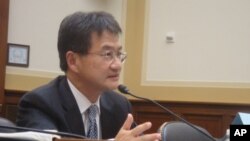Cambodia will have to pay at least some of its war-era debt before the US can consider forgiving the rest, a State Department official told Congress on Thursday.
Joseph Yun, deputy assistant secretary of state for East Asia and Pacific Affairs, told a House of Representatives subcommittee that the US administration does not have a policy to cancel debt, for fear that it sends the wrong message in debt management.
Cambodia owes the US some $300 million, plus fees, in debt incurred during the Lon Nol regime of the 1970s, but current officials, including Prime Minister Hun Sen, say they should not have to pay back money borrowed by the pre-Khmer Rouge government.
Cambodia and the Paris Club group of creditors agreed to restructure the debt in 1995, but Cambodia has yet to ratify the agreement, Yun told the Foreign Affairs Committee's Asia, Pacific and Global Environment Subcommittee.
“The administration has therefore urged the Cambodian government to sign the bilateral agreement and re-establish a track record of timely repayment under that agreement,” Yun said in official testimony.
“We have communicated to the Cambodian government that if it makes scheduled payments for at least one year, the US government would signal to the IMF that efforts are underway to resolve the country's official arrears,” he said. “Should Cambodia then obtain an IMF program and a future Paris Club debt treatment, the action could pave the way for generous rescheduling of the accumulated arrears owed to the United States.”
The total amount owed the government with fees climbed to $445 million in 2009, Yun said.
However, Eni Faleomavaega, a Democrat from American Samoa and chairman of the subcommittee, said precedents exist for debt forgiveness, including with Iraq and Vietnam, whose debts were much greater.
In those countries, the debt was canceled and the funds diverted to education, he said.
"Greater engagement with Cambodia could help the United States achieve our foreign policy goal in the region and counter adverse influence requiring a payment of debt,” Faleomavaega said during the hearing. “Requiring a payment of a debt incurred by an illegitimate government more than 30 years ago, without consideration of Cambodia's historical drama, will run counter to the need for greater engagement.”
The US has sought to expand its influence in Southeast Asia, where China holds much sway and provides aid packages and infrastructure without some of the Western benchmarks for human rights and democracy.
Cambodia, which benefits greatly from both Chinese and Western aid, has insisted the debt be forgiven, saying it could better spend the money on education and health programs.
Hem Heng, Cambodia's ambassador to the US, said it was “not reasonable” to expect Cambodia to sign onto a debt repayment schedule only to review it a year later.
“Once we sign it, we must be obliged to pay a certain amount per year,” he said. “It is not possible that we implement this for one year and then review it.”





